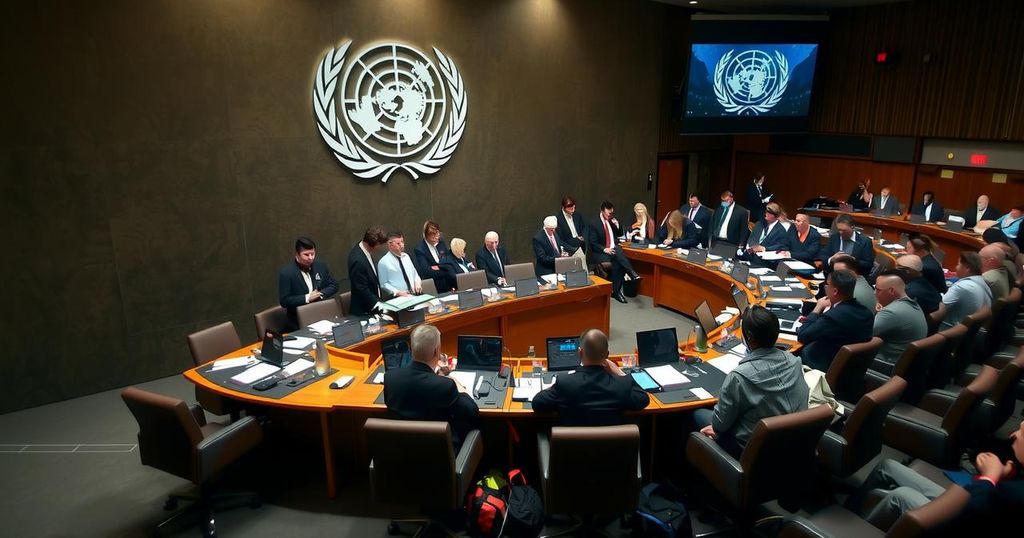Climate change
AFRICA, ASIA, AUSTRALIA, AZERBAIJAN, BAKU, BOWEN, CHRIS BOWEN, CLIMATE CHANGE, CLIMATE JUSTICE, CUBA, DIEGO BALANZA, DION GEORGE, ENVIRONMENTAL POLICY, LIKE - MINDED GROUP, NEW ZEALAND, NORTH AMERICA, OCEANIA, PARIS AGREEMENT, RENEWABLE ENERGY, SOUTH AFRICA, UN, UNITED NATIONS
Isaac Bennett
0 Comments
Urgent Negotiations at COP29 for Climate Financing and Emission Commitments
Negotiators at UN climate talks in Azerbaijan face pressing deadlines to secure a funding agreement for vulnerable nations affected by climate change. Developing countries demand $1.3 trillion for adaptation and clean energy. Discrepancies exist regarding funding amounts and contributor responsibilities. Key figures call for decisive leadership and increased financial pledges from developed nations to support a transition away from fossil fuels and address climate impacts effectively.
As the United Nations climate talks unfold in Baku, Azerbaijan, the urgency for negotiators to reach an agreement intensifies. With the COP29 summit drawing to a close, there is significant pressure to secure a deal that effectively addresses the financial needs of vulnerable nations in combating climate change. These nations are advocating for a collective investment of $1.3 trillion to enhance their resilience and transition to clean energy systems, a figure that exceeds current offerings from wealthier countries. Discussions center on critical components, namely the required financial amounts, the nature of these funds—whether grants or loans—and determining the contributors. Chris Bowen, Australia’s climate minister, highlighted the diversity of financial proposals on the table, which ranges from $440 billion to $1.3 trillion, amidst dissatisfaction from developing nations about the responsibility allocated to them. Meanwhile, Diego Balanza, representing the Like-Minded Group, underscored that the proposed $200 billion is woefully inadequate. Addressing fossil fuel dependence, South Africa’s climate minister, Dion George, emphasized the commitment to a gradual shift away from fossil fuels, while New Zealand’s Simon Watts expressed optimism regarding progress on emissions trading systems. Alden Meyer from E3G poignantly noted the stagnant nature of the negotiations, stating that discussions are cyclical with no substantial breakthroughs. German climate envoy Jennifer Morgan urged leadership in the negotiations to ensure a commitment to a green future, emphasizing the need for ambitious outcomes. Concurrently, United Nations Secretary-General Antonio Guterres articulated the pivotal role of the Group of 20 in influencing results at COP29 and advocated for increased public financing to support developing nations. Brazilian President Luiz Inácio Lula da Silva called for advanced emission reduction commitments from developed nations as they represent a substantial portion of global emissions, urging collective action, even if progress is incremental.
The backdrop to this year’s climate talks is the growing recognition of the urgency to address climate change impacts disproportionately felt by vulnerable nations. As the world grapples with environmental crises, developing countries have increasingly advocated for more substantial financial support to adapt and mitigate the effects of climate change. The lack of satisfactory progress in previous negotiations has heightened tensions, making the current COP29 summit essential for securing necessary funding and commitments from developed nations, who historically have contributed more to greenhouse gas emissions.
The discussions at COP29 are marked by heightened urgency, with vulnerable nations demanding significantly increased financial support to address climate change adaptation needs. Despite various proposals on funding amounts, there remains a substantial gap between the expectations of developing countries and the commitments of wealthier nations. As negotiations continue, the focus will be on achieving concrete outcomes that reflect a collective responsibility to mitigate climate risks. Success will depend heavily on the commitment of developed nations to fulfill their financial obligations and lead in reducing their own emissions.
Original Source: abcnews.go.com




Post Comment